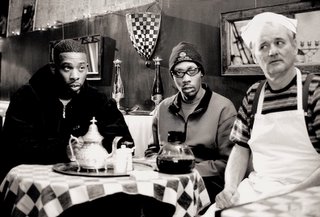
Bob Dylan, One More Cup of Coffee.
Emmett Miller, You're the Cream in My Coffee.
The Boswell Sisters, Coffee in the Morning and Kisses in the Night.
Jaybird Coleman, Coffee Grinder Blues.
Serge Gainsbourg, Couleur Cafe.
J.S. Bach, "Ei, Wie Schmeckt" (from the Coffee Cantata).
The Ink Spots, Java Jive.
Tom T. Hall, Don't Forget the Coffee Billy Joe.
Lefty Frizzell, Cigarettes and Coffee Blues.
Lightnin' Hopkins, Coffee Blues.
Peggy Lee, Black Coffee.
Squeeze, Black Coffee in Bed.
Duke Ellington, Cafe au Lait.
MC Lyte, Cappuccino.
The White Stripes, One More Cup of Coffee.
A Prelude
"The coffee maker was almost ready to bubble. I turned the flame low and watched the water rise. It hung a little at the bottom of the glass tube. I turned the flame up just enough to get it over the hump and then turned it low again quickly. I stirred the coffee and covered it. I set my timer for three minutes. Very methodical guy, Marlowe. Nothing must interfere with his coffee technique. Not even a gun in the hands of a desperate character...
I did a fast wash-up in the bathroom and the bell of the timer went just as I got back. I cut the flame and set the coffee maker on a straw mat on the table. Why did I go into such detail? Because the charged atmosphere made every little thing stand out as a performance, a movement distinct and vastly important. It was one of those hypersensitive moments when all your automatic movements, however long established, however habitual, become separate acts of will. You’re like a man learning to walk after polio. You take nothing for granted, absolutely nothing at all.
The coffee was all down and the air rushed in with its usual fuss and the coffee bubbled and then became quiet. I removed the top of the maker and set it on the drainboard in the socket of the cover.
I poured two cups and added a slug to his. "Black for you, Terry." I added two lumps of sugar and some cream to mine. I was coming out of it by now. I wasn’t conscious of how I opened the Frig and got the cream carton.
I sat down across from him. He hadn’t moved. He was propped in the corner of the nook, rigid. Then without warning his head came down on the table and he was sobbing...He lifted his head and saw the coffee and drank some slowly, not looking at me. “I didn’t shoot anybody,” he said."
Raymond Chandler, The Long Goodbye.
Enter Caffeine, Stage Left
All right, sober up. With the appearance of coffee, we make the great transition in the 7 Drinks of Mankind--crossing a continental divide of sorts, from evening to morning, from lassitude to promptness, downers to uppers, agreeable dullness to keen wit, sloppiness to precision, from play to work, Catholicism to Protestantism, classical to modern, from disgrace to propriety, from the loud joys of tavern to the serenity of the home kitchen.
Coffee is the blood of the modern world, the oil in its circulatory system. Without coffee, entire businesses ranging from coding to telemarketing to bond trading simply could not function. Nor could writing. A confession: the typical "Locust St" entry (not an elephantine monster like this one) is often the result of three strong cups of coffee taken in a 45-minute period.
Songs about coffee generally are not celebratory, but are often quotidian, focusing on simple pleasures. They are hymns of reconciliation, of quiet mornings, of bringing things back to order. Not to say they are celibate--some cap a long night's affair. Even the louche swinger in Rod Stewart's "Do Ya Think I'm Sexy" apologetically tells his conquest in the last verse that he's out of milk and coffee.
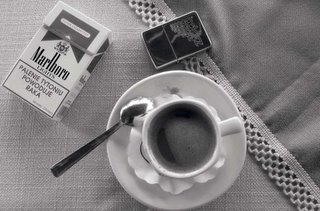
The instruments of civilization
Coffee is the balm of recovery. Bob Dylan, by mid-1966, was a complete wreck, barely eating, living on pills and pyschedelics, until a happy motorcycle crash got Dylan off the hook for various obligations.
By the summer of 1967 Dylan had been renewed, living up in the country with his wife and growing family, free from immediate pressures, and writing reams of songs. Accounts of the period describe a typical day as Dylan taking his kids to school and then showing up at the house the Band was living in (Big Pink), brewing astonishingly strong coffee on the stove, and downing cup after cup while pounding out on a typewriter "The Mighty Quinn" and "I Shall Be Released" and "Sign on the Cross" and "This Wheel's on Fire", and the rest of the great Basement Tapes songs. When the Band would stumble out of bed in the afternoon, they'd record them.
Dylan's "One More Cup of Coffee", Bob's gyspy fantasy, is from 1976's Desire.
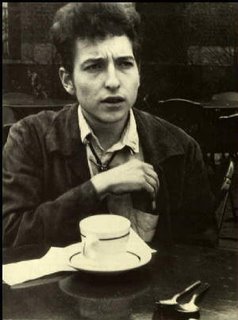
The Wine of Arabia
Coffee is a relatively modern drink. While chewing coffee beans likely provided people in Eastern Africa with simple caffeine highs for millennia, no one in the classical world knew of the substance. And while the Arabs make a few scattered references to coffee around the year 1100, coffee drinking really comes into fruition much later, around 1500.
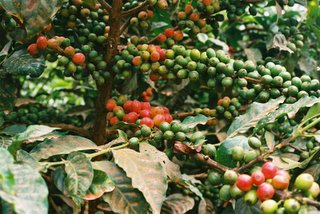
There is a myth of origins, of course. This time, it's happy Kaldi, an Ethiopian goatherd who, according to legend, noticed that when his goats ate the crimson berries of the wild coffee bush, they acted jumpy. So Kaldi, being an inquisitive sort of goatherd, eats the beans himself and feels a sense of exaltion. He runs to the local imam, who, disapproving, throws the berries into the fire. The smell of the roasting beans captivates everyone around the fire (including, apparently, the stern holy man), and so someone scoops up the burned berries, mixes them in water, and drinks the first cup of coffee in history.
This is likely complete nonsense, but it reflects the likely fact that coffee drinking, or at least bean chewing, began in Africa somewhere (most likely Ethiopia), possibly in the 500-1000 AD period.
The first written reference to coffee comes around the turn of the 11th Century, in a copious medical reference book, Al-Ganum fit-Tebb (known generally as the Canon of Medicine), by the Islamic scholar Ibn Sina, who refers to something called "Buncham", a drink brewed from the "bunn" plant:
"It is hot and dry in the first degree...it fortifies the members, cleans the skin, and dries up the humidities that are under it, and gives an excellent smell to all the body."
Not too dissimlar from a Folger's ad from the last century. Weirdly, however, while coffee was apparently known about around 1100, it doesn't become popular for centuries more. Europeans and Muslims regularly encountered each other (often at opposing sides of a crusade) during that time, but no Europeans mentioned coffee, and for that matter, neither did the Muslims of the period.
Coffee's true breeding ground would be Sufi monasteries located in today's Yemen. By the 14th Century, juice of the "bunn" plant, now called qahwah by Muslims, was being used by Sufi mystics to keep themselves awake during all-night chants. Likely at some earlier point in time, Ethiopian coffee beans had been transplanted to Yemen, which is right across the Red Sea.
And then, at last and all at once, coffee drinking begins to explode. By 1510, Muslims in Cairo and Mecca are drinking it; by 1550, it reached Constantinople. And it is here, the gateway to Europe, where Westerners at last encounter what would be one of their fundamental drinks.

The First Coffee Drinker in England
It is an early morning in Balliol College, in Oxford. A few students are milling around the refectory, weakly gossiping or thumbing their eyes to ward off sleep. Then he arrives--the Greek who makes the strange drink. There's been talk about him--that he will only communicate in Ionic Greek, that he killed a man in Malta, that he is a Papist spy, or an informant for Archbishop Laud.
He is a slight man, with long crest of black hair; he keeps to himself, carrying in his hand a small cloth bag, from which, as he nears the open fire, he withdraws a palmful of grains. Some have seen him late at night making these "grounds", taking what appears to be some variety of cherries and mashing them to paste using a mortar and pestle from the apothecary. He pours the grains into a pot, to which he then adds a dose of water. He places the pot upon the fire, stirring it until it boils, which makes a most particular smell, and pours the steaming result into a metal flagon, which he drinks sullenly.
John Evelyn, who was at the college at this time, recorded the strange occurance in a diary entry in May 1637:
"There came in my time to the College one Nathaniel Conopios, out of Greece, sent into England, from Cyril, the patriarch of Constantinople… He was the first I ever saw drink Caffe, not heard of then in England, nor till many years after made a common entertainment all over the nation."
Conopios, who was born in Crete, had worked for the patriarch of Constantinople until his employer was strangled and Conopios fled for his life. Winding up in Oxford, he brought with him the knowledge of a drink the Turks had recently introduced to Constantinople. Soon afterward, Conopios was expelled from Oxford by mysterious "Parliamentary visitors" and is never heard from again. But less than twenty years later, the first coffehouse had opened in London--by 1700, there were thousands.

Around the same time as Conopios, Robert Burton, an Oxford don, made a reference to coffee in his massive, genius Anatomy of Melancholy:
"The Turks have a drink called coffa (for they use no wine), so named of a berry black as soot, and as bitter (like that black drink which was in use among the Lacedaemonians, and perhaps the same), which they sip still of, and sup as warm as they can suffer; they spend much time in those coffa-houses, which are somewhat like our alehouses or taverns, and there they sit chatting and drinking to drive away the time..."
Coffeehouse plots

With the advent of the coffeehouse, something quite novel appeared. There is a fundamental difference between the bar and the coffeehouse: In the bar, one's focus is on drinking and relaxing, forgetting troubles, trying to find distractions--it is a place to get away from society through the means of fabricating an alternate, happier society--a commonality of drinkers.
In the coffeehouse, no one is getting drunk. They're getting agitated, hopped-up--they want to talk about things that bother them. Did you ever notice? The questions begin. Of what authority does the King cite in the matter? The President's an ass. And, adding fuel to the blaze, there are all sorts of things for these people to read now, and talk about, and angrily respond to: newsletters, pamphlets, essays, newspapers; acidic verses, allegories, lampoons; 10-point plans, jeremiads, manifestos.
"Here a Man, of my Temper, is in his Element; for if he cannot talk, he can still be more agreeable to his Company, as well as pleased in himself, in being only an Hearer," Richard Steele wrote of coffeehouses in Spectator 49, in April 1711, adding:
"I, who am at the Coffee-house at Six in a Morning, know that my Friend Beaver the Haberdasher has a Levy of more undissembled Friends and Admirers, than most of the Courtiers or Generals of Great-Britain. Every Man about him has, perhaps, a News-Paper in his Hand; but none can pretend to guess what Step will be taken in any one Court of Europe, till Mr. Beaver has thrown down his Pipe, and declares what Measures the Allies must enter into upon this new Posture of Affairs."

You could say that most of the major revolutions of the past 300 years emerged from coffeehouses--to milder varieties like the Glorious Revolution in England, to the French overthrow of the monarchy (Jules Michelet: "those who assembled in the Cafe de Procope saw, with penetrating glance, in the depths of their black drink, the illumination of the year of the revolution.")
Not all revolutions were as noble. Above is George Grosz's Kaffeehaus, a lithograph from 1917, depicting the type of petri dish out of which the Nazi Party germinated--coffeehouses full of disaffected war veterans, cranks, closet cases, crypto-monarchists, budding fascists.
Is it any wonder authorities kept trying to shut down the places? From Kha'ir Beg, the chief of police in Mecca, who saw coffeehouses as hotbeds of sedition, and shuttered them until the sultan of Cairo overruled him, to King Charles II, who in 1675, issued a royal decree "for the Suppression of Coffee Houses" ("the great resort of Idle and disaffected persons").
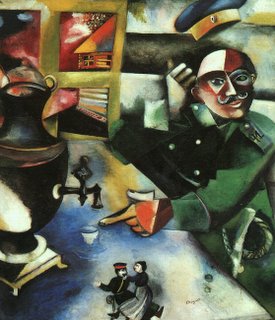
Even today, in your local Starbucks, is likely to be a frenzied man or woman typing at a laptop, utterly aggreived at life, government, society, and determined that things need to change.
Waiter, waiter, percolator!
By the 1720s, coffee drinking had become so established a phenomenon that even women were taking it. Naturally, the world was going to end.
Johann Sebastian Bach's Kaffee-Kantate (officially known as "Schweigt stille, plaudert nicht" BWV 211) is one of Bach's more enjoyable trifles. It was composed in 1734 as part of a series of "Ordinary Concerts" Bach wrote for a musical college in Leipzig (in which the first coffeehouse had opened in 1694). The storyline is that the bourgeois father, Schlendrian, is worried about his daughter Liesgen's scandalous coffee addiction.
The aria "Ei, wie schmeckt" is Liesgen's rebuttal, a rapturous ode to drinking java. (This recording is sung by Ann Monoyios.) The lyrics are:
Ei! wie schmeckt der Coffee süße,
Lieblicher als tausend Küsse,
Milder als Muskatenwein.
Coffee, Coffee muß ich haben,
Und wenn jemand mich will laben,
Ach, so schenkt mir Coffee ein!
My poor three-semester knowledge of German translates this as:
Mmm, how sweet the coffee tastes,
sweeter than a thousand kisses,
milder than Muscatel wine..
Coffee! Coffee! I must have it!
and when someone wants to give me a treat[?]
ach! pour me a coffee.
(any legitimate Germans reading, please correct this)
All ends well--Liesgen agrees to be wedded off and spare her father future scandals, but includes in her request to prospective suitors that she needs to brew coffee each day. A good recording of the Coffee Cantata is here.

From 1941, the Ink Spots' "Java Jive" is another, groovier take on coffee's sweet addiction. This track comes from a new contributor to the "7 Drinks" series--Jamie, from The Sound and Fury of Radio CRMW. Available here.
(I totally forgot to ask Kat, who would have perfect for this one!)
Cream in My Coffee
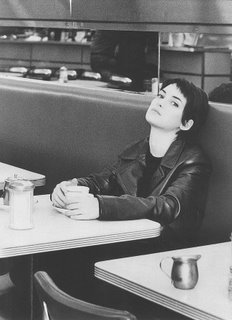
Enough history for a bit. Enjoy these odes to coffee-fueled romance.
Emmett Miller's "You're the Cream in My Coffee" is from 1929 and features Tommy and Jimmy Dorsey and Eddie Lang. Miller, the last of the blackface minstrels, was a lost link between the 19th and 20th Century musics, a prime inspiration for Jimmie Rodgers and Hank Williams. From The Minstrel Man of Georgia, an essential (and appallingly out-of-print) compilation.
The Boswell Sisters were three beautiful, sassy, brilliant singers whose sound would be ripped off and cornified by the Andrews Sisters in the following decade, and, far, far worse, by the McGuire Sisters in the '50s. "Coffee in the Morning and Kisses in the Night," recorded in 1934, is on That's How Rhythm Was Born.
More coarsely, here's Jaybird Coleman's "Coffee Grinder Blues", from 1930, in which coffee grinding is a metaphor for..well, guess. On Alabama Blues.
And Serge Gainsbourg's "Couleur Cafe", from 1964, is a choice by the Rev. Frost. On Couleur Cafe.
The daily planet
"This is what I saw yesterday morning through the tall, old artist-windows of my apartment. The bright morning sky that day had a rare blue and white fluffiness, as if a vacuum cleaner had raced across the heavens as a weekly, clarifying duty. It is hard to set nature apart in the city, and everything, inside and out, takes on the frame of a relentless housekeeping. Someone has let the coffee boil over; on this floor it must be."
Elizabeth Hardwick, Sleepless Nights.
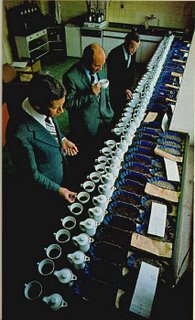
One of coffee's gifts is that it provides constancy in an inconstant world. No matter where you are, where you wake up, in what condition you or your country is in, you can likely get a cup of coffee to start the day. Even if it's instant coffee. (Ugh.)
Tom T. Hall's "Don't Forget the Coffee" is from 1973's Rhymer and Other Five and Dimers.
"We must observe the amenities
even if we are going nuts.
So heat the coffee
and it is time
to get the lock changed."
James Schuyler.
Headaches
"Coffee is a much more powerful stimulant than is believed. A strong man can live a long time and still drink two bottles of wine every day. The same man could not long support a like quantity of coffee; he would become imbecelic, or would die of consumption...It is a sacred duty for all the fathers and mothers of the world to forbid coffee to their children with great severity, if they do not wish to produce dried-up little monsters, stunted and old before they are twenty."
Jean Anthelme Brillat-Savarin.
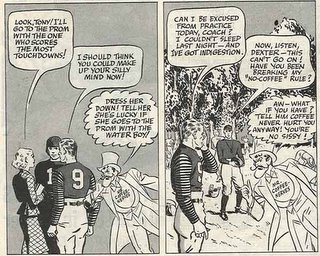
more "Mr Coffee Nerves" adventures at Lileks.
Two takes on drinking too much coffee:
Lefty Frizzell's take on "Cigarettes and Coffee Blues" is from 1958 and can be found on Look What Thoughts Will Do.
And Lightnin' Hopkins' "Coffee Blues", from 1951, is on Blues Masters.
Cream or sugar?
"It's just like when you've got some coffee that's too black, which means it's too strong. What you do? You integrate it with cream; you make it weak. If you pour too much cream in, you won't even know you ever had coffee. It used to be hot, it becomes cool. It used to be strong, it becomes weak. It used to wake you up, now it'll put you to sleep. This is what they did with the march on Washington."
Malcolm X, Message to the Grass Roots, 1963.
Do you like coffee straight or with sugar and/or cream? I've always taken it black (though a little cream once in a while is fine.) I've got nothing to say about the recent trend of alleged coffees from Starbucks that are more akin to milkshakes than actual java.
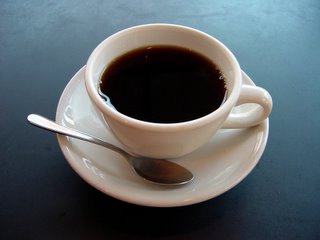
Two wistful songs about black coffee:
Peggy Lee's "Black Coffee" one of the tracks that revitalized her career in the early 1950s, is sultry and regretful. On Best of.
Squeeze's "Black Coffee in Bed" marks the end of another affair, with just memories and a stain on the singer's notebook as evidence. From 1982, and the the last of the great string of singles the band released over the course of five years. On 45s and Under.
And two with milk:
Duke Ellington's "Cafe au Lait" is from 1957's Such Sweet Thunder, one of Duke's more ambitious records (with tracks tied to Shakespearean themes and characters).
And MC Lyte's "Cappuccino", in which getting a mixed coffee proves a sobering experience. From 1989's Eyes on This.
"I'll have fried aiggs,' said the Virginian. 'Cooked both sides.'
'White wings!' sang the colonel through the hole. 'Let 'em fly up and down.'
'Coffee an' no milk,' said the Virginian.
'Draw one in the dark!' the colonel roared.
'And beefsteak, rare.'
'One slaughter in the pan, and let the blood drip!"
Owen Wister, The Virginian.
End of the pot
"The coffee had been steadily growing more and more execrable for the space of three weeks, till at last it had ceased to be coffee altogether and had assumed the nature of mere discolored water--so this person said. He said it was so weak that it was transparent an inch in depth around the edge of the cup.
As he approached the table one morning he saw the transparent edge--by means of his extraordinary vision long before he got to his seat. He went back and complained in a high-handed way to Capt. Duncan. He said the coffee was disgraceful. The Captain showed his. It seemed tolerably good. The incipient mutineer was more outraged than ever, then, at what he denounced as the partiality shown the captain's table over the other tables in the ship. He flourished back and got his cup and set it down triumphantly, and said:
'Just try that mixture once, Captain Duncan.'
He smelt it--tasted it--smiled benignantly--then said:
'It is inferior--for coffee--but it is pretty fair tea.'
The humbled mutineer smelt it, tasted it, and returned to his seat. He had made an egregious ass of himself before the whole ship. He did it no more. After that he took things as they came. That was me."
Mark Twain, the Innocents Abroad.
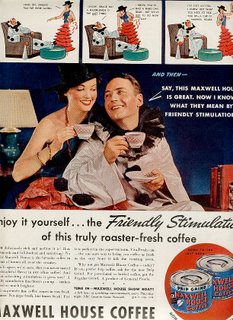
Tom Standage (whose book has inspired this series) notes that while the traditional Arabic method of preparing coffee requires bringing a mixture of ground beans and water to a boil three times in rapid succession, the Western method has produced far more adultered brews.
Originally, in England, coffee was taxed by the gallon, and so coffeehouse owners had to prepare coffee ahead of time to pay their duties, and then had to reheat the coffee for consumption. So basically, a traveller entering a classic English coffeehouse of 1670 would have tasted coffee that had been prepared possibly days earlier and reheated again and again--in short, it would have tasted unbearably nasty and would have required massive doses of sugar to get down.
"Perhaps the nearest modern equivalent," Standage writes, citing coffee expert Jeremy Torz, "is the coffee in an office percolator that has been left switched on for a day or two."
It reminds me of a former co-worker who prided herself on never washing her office coffee cup, whose insides, over the years, had become stained as black as tar. The office is never a good place for the light of heart, or of stomach.
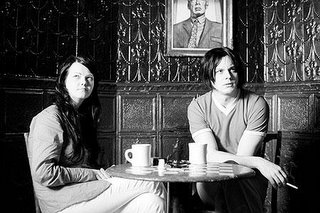
Jack and Meg take five
So finish your cup with The White Stripes' take on Dylan, in which Jack White sings as if he expects he's not coming back from the valley below. From 1999, on White Stripes.
That's it until after Christmas, when we'll hopefully get through the remaining entries in this series faster than at our current pace. Enjoy your beer, wine, booze and coffee in great measure this Christmas--have a merry and safe holiday.
No comments:
Post a Comment